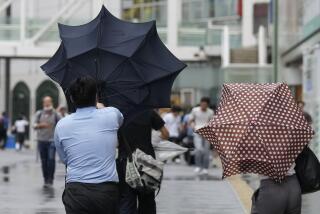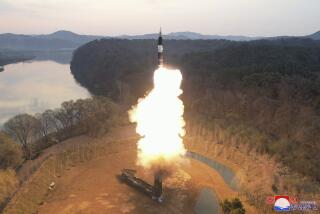Japan readies defenses for possible missile test by North Korea
Japan readied its missile defense systems Tuesday against a possible North Korean weapons test, saying it would shoot down any missiles or debris if Japanese territory was threatened.
Patriot anti-missile batteries were deployed on the grounds of the Defense Ministry in Tokyo and at military installations in and around the capital, according to Japanese news reports. The PAC-3 batteries will also be based on the island of Okinawa, which hosts the bulk of U.S. troops in Japan, sooner than planned in response to North Korea’s threats, the Asahi Shimbun reported.
Deploying the anti-missile system in Tokyo is “part of our moves to establish a system to protect the lives of our citizens and ensure their safety,” Chief Cabinet Secretary Yoshihide Suga said at a news conference, according to Jiji Press.
Suga earlier said that the missiles will be used solely to protect Japan, according to the Japan Times. Prime Minister Shinzo Abe has pushed for Japan to reinterpret its constitution, which bans waging war, to allow Japan to intercept missiles fired at United States targets.
Escalating threats from North Korea have troubled nearby Japan. Pyongyang has warned that it could attack U.S. military bases in Japan and on the Pacific island of Guam. The country recently moved a medium-range rocket to its eastern coast, putting South Korea, Japan and other parts of Southeast Asia in range.
The latest rhetoric follows joint U.S.-South Korean military drills and new United Nations sanctions imposed on Pyongyang after it carried out its third nuclear test in February.
Sankei, a Japanese daily newspaper, reported that Pyongyang has warned some foreign embassies that it plans to launch a missile Wednesday that would arc over Japanese territory and land in the Pacific Ocean. North Korea has launched rockets eastward in the past, causing no bloodshed but irritating Japanese defense officials.
Four years ago, such a launch passed over the northern part of Japan’s main island before shedding debris and dropping into the Pacific Ocean, prompting Japan to call for an emergency meeting of the United Nations Security Council.
U.S. and South Korean officials have reported no signs that North Korea is preparing a major military offensive, despite the belligerent rhetoric from Pyongyang. Analysts say war is unlikely. But mounting tension has raised fears that small miscalculations could trigger deadly conflict in the region.
ALSO:
Kerry leaves Israel with hopes, but few results
Kenya’s new president sworn in amid divisions
Earthquake reported to kill dozens in southern Iran
Jung-yoon Choi in Seoul contributed to this report.
More to Read
Sign up for Essential California
The most important California stories and recommendations in your inbox every morning.
You may occasionally receive promotional content from the Los Angeles Times.










